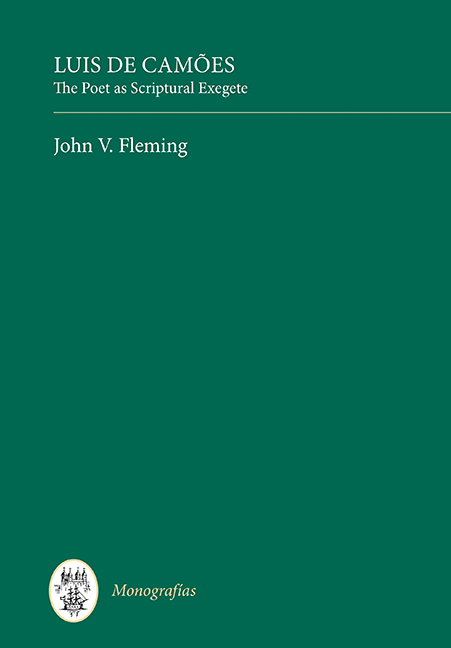1 - Poetry as Exegesis
Published online by Cambridge University Press: 15 September 2017
Summary
My subject in this book will be the vernacular poetic commentary made by Luís de Camões upon Psalm 136, Super flumina. Hispanist editors and critics, who have made the poem known under some such title as “Babylon and Jerusalem,” have frequently acknowledged it as one of the great masterpieces of the lyric poetry of the Renaissance. Its status as scriptural exegesis, however, remains largely unexplored by literary scholars. Yet one cannot get beyond the poem's first word without encountering a significant problem directly related to its exegetical tradition. Is the first phrase of the poem Sobre os rios or Sôbolos rios? We find both forms in the printed texts, and they mean the same thing. There is perhaps a rough parallel with the English phrases on top of and atop, with the latter being a more “poetic” or “euphonious” version of the former.
The first known text of Camões's poem is that in the Cancioneiro or poetic anthology that bears the name of a sixteenth-century owner, Cristovão Borges. It begins Sobre os rios. Quite apart from its temporal priority of recording, which may or may not be a trustworthy indication of textual priority, there is a good reason to attribute considerable authority to this version. The reason is that it includes, in the conventional manner of a medieval or Renaissance scriptural commentary, the Latin text of the scripture verses being commented upon. In exegetical terms, it records both “text” and “gloss.” In other words, the scribe of the manuscript from which the Cancioneiro took the poem's text explicitly acknowledged the genre of the piece—scriptural exegesis.
On the other hand, the Cancioneiro text is radically deficient in one regard. It has only about half the text of the whole poem of the earliest printed editions, ending with a few strophes of commentary on the first five verses of the nineverse psalm. (The fifth and sixth verses are combined in the “textus” apparatus in the Cancioneiro.) There is no plausible way that this could be described as an “early version” of the finished poem of the 1597 edition of Camões's poems, in which the incipit is Sôbolos rios. We are not wont to speak of the first movement of a symphony as an “early version” of the whole work. That is what we have here. The evidence is inconclusive.
- Type
- Chapter
- Information
- Luis de CamõesThe Poet as Scriptural Exegete, pp. 1 - 30Publisher: Boydell & BrewerPrint publication year: 2017

